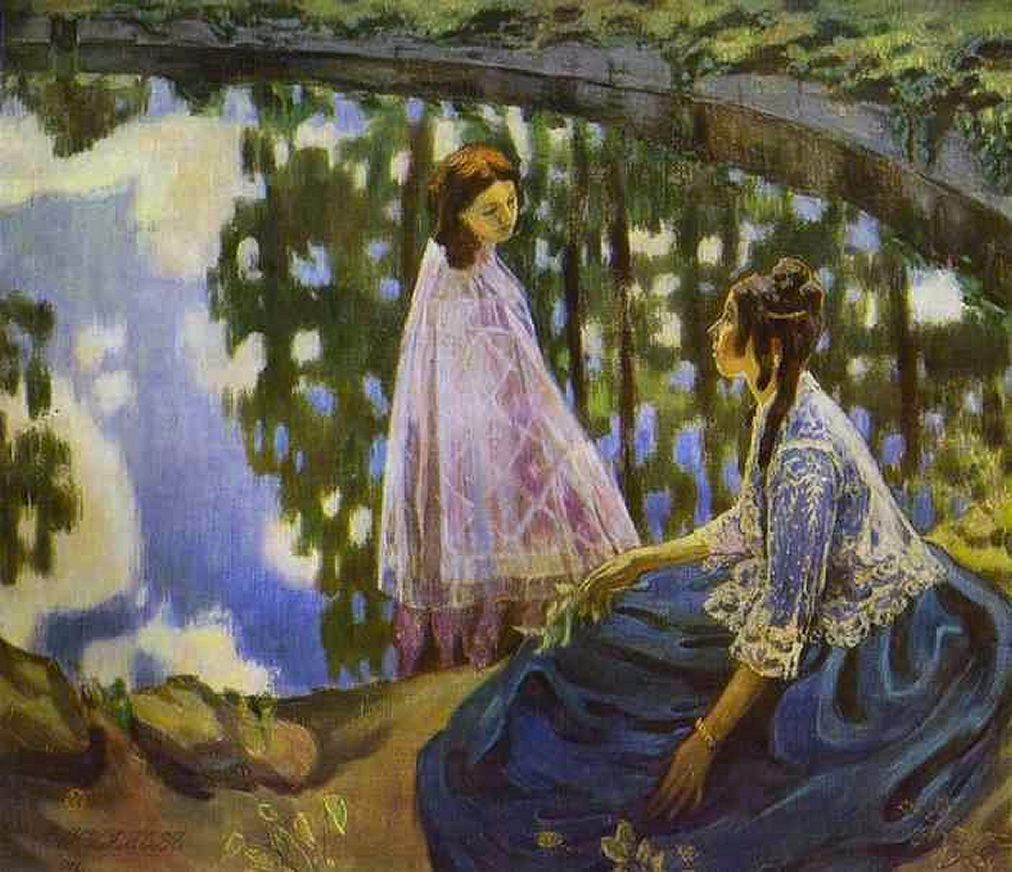Sergey Esenin (1895-1925) was born into a peasant family in Riazan province, but lived in Moscow from 1912 to 1915. Thence he moved to St Petersburg, where he met Blok,
Gorodetsky and Kliuev, the latter becoming his tutor, friend and perhaps lover. The pupil soon outdid the master, however, and Esenin joined with Shershenevich and Mariengof to found the Imagist
school of poetry. Esinin's aesthetic was different, but he shared with them a rowdy hooliganism that began to appear in his themes. In 1923 he married the famous dancer Isadora Duncan,
and travelled with her to western Europe and the United States. Duncan spoke no Russian, and the couple were divorced a year later. Esenin returned to Russia, gave up Imagism, and remarried.
Though somewhat the worse for drink, Esenin travelled extensively, in the Caucasus and beyond, but in 1925 hanged himself in a Leningrad hotel room.
Esenin depicted himself as the innocent country boy spoiled by urban bohemia, a pose that brought him immense popularity but little critical acclaim. Yet Esenin was and still is a much-loved poet, appealing
to all classes, and the poetry is far from artless nostalgia for a vanished country life. He developed quite rapidly on arriving in St. Petersburg, becoming deeper,
more mysterious. There is a greater awareness of pain, a growing sense of loss of innocence. The narrative thread is less clear, and the fragmented poems become ornamented
with modernist imagery.

Despite the alcoholism, the last four years of Esinin's life show a return to steady writing: a wider range of
subjects, reflections on love affairs, and an alienation from life, which may have exacerbated the suicidal tendencies.
Устал я жить в родном краю
Устал я жить в родном краю
В тоске по гречневым просторам.
Покину хижину мою,
Уйду бродягою и вором.
Пойду по белым кудрям дня
Искать убогое жилище.
И друг любимый на меня
Наточит нож за голенище.
Весной и солнцем на лугу
Обвита жёлтая дорога,
И та, чьё имя берегу,
Меня прогонит от порога.
И вновь вернуся в отчий дом,
Чужою радостью утешусь,
В зелёный вечер под окном
На рукаве своём повешусь.
Седые вербы у плетня
Нежнее головы наклонят.
И необмытого меня
Под лай собачий похоронят.
А месяц будет плыть и плыть,
Роняя вёсла по озёрам…
И Русь всё так же будет жить,
Плясать и плакать у забора.
The TTS Audio Recording is:
The poem is in iambic tetrameters, rhymed aBaB:
Уста́л я жить в родно́м краю́ 4a
В тоске́ по гре́чневым просто́рам. 4B
Поки́ну хи́жину мою́, 4a
Уйду́ бродя́гою и во́ром. 4B
Esenine's tone is difficult to convey, and
Ruverses have 5 versions of this popular
poem, of varying success as verse. I give the first stanza of each:
1. Rupert Moreton
I’m tired of life in my own land,
The boredom of the fields’ expanses,
I’m going to quit my cabin and
Like tramp or thief I’ll take my chances.
2. Alec Vagapov
I'm tired of living in my land
With boring fields and buckwheat fragrant,
I'll leave my home for ever, and
Begin the life of thief and vagrant.
3. by Bob Lokhar
I'm tired of my native land,
I'm longing for the buckwheat open.
I'll leave my cabin in the end,
I'll go to be a thief and hobo!
4. Peter Tempest
I’m tired of home life, sighs they heave
As buckwheat fills the far field yonder.
My country cottage I shall leave,
А vagabond and thief, I’ll wander.
5. Anton Yakovlev
I’m tired of living in my native land,
Yearning for the vast fields of buckwheat.
I’ll leave my shack
To be a vagrant and a thief.
Esenin was an Imagist, and so inclined to place isolated images in his poems, sometimes self-evident in reference,
and sometimes not. Here we have зеленый вечер (green evening), where green, I imagine, means alive and fertile. There is also the friend who sharpens up his knife (who may welcome or attack the
poet), and some
other friend about whose name Esenin cares about. They give the poem an inconsequential air of mystery.
I'll Leave my Native Land
Tired of native lands, I'll roam
where buckwheat offers no relief.
I’d leave the little hut that's home
as does a vagabond or thief.
I’ll walk the white curls, rain or shine;
some sorry place can let me in.
I’ll get a well-loved friend of mine
to sharpen knife against his shin.
In sunny fields the spring is out;
pale roads twist on without a care.
The girl I cherish, think about,
must turf me off her doorstep there.
I’ll go to father's house again
and share the joy its folk receive.
When green is evening’s window pane,
I’ll hang myself upon my sleeve.
Grey willows weave the wattle fence;
their gentle heads are sideways grown.
Unwashed, I will be carted thence,
interred where barking dog is thrown.
The moon goes sailing, sailing on,
dropping oars in waters. Hence
our life in Russia's always gone,
in tears and dancing to that fence.
1. Bristol, E., A History of Russian Poetry (O.U.P., 1991) 246-8.
2. Mirsky, D.S, Contemporary Russian Literature (Alfred A Knopf, 1926) 264-8.
3. Ruverses Esinin introduction.
4. Сергей Есенин — Устал я жить в родном краю. Short article in Russian.
Russian poem translations on this site: listing.